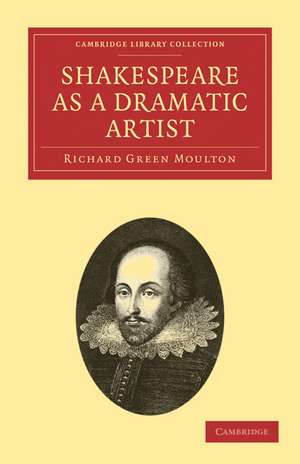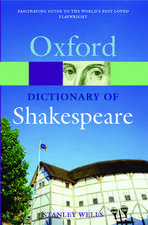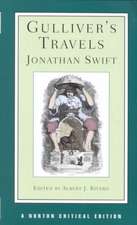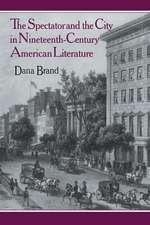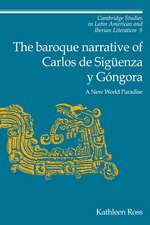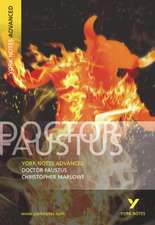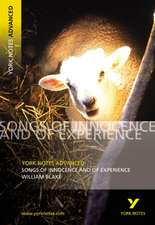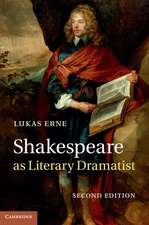Shakespeare as a Dramatic Artist: A Popular Illustration of the Principles of Scientific Criticism: Cambridge Library Collection - Literary Studies
Autor Richard Green Moultonen Limba Engleză Paperback – 2 mai 2011
| Toate formatele și edițiile | Preț | Express |
|---|---|---|
| Paperback (2) | 143.50 lei 38-44 zile | |
| HardPress Publishing – 9 ian 2012 | 143.50 lei 38-44 zile | |
| Cambridge University Press – 2 mai 2011 | 422.55 lei 43-57 zile |
Din seria Cambridge Library Collection - Literary Studies
-
 Preț: 373.57 lei
Preț: 373.57 lei - 19%
 Preț: 641.83 lei
Preț: 641.83 lei -
 Preț: 227.84 lei
Preț: 227.84 lei -
 Preț: 130.80 lei
Preț: 130.80 lei - 23%
 Preț: 1009.14 lei
Preț: 1009.14 lei -
 Preț: 249.19 lei
Preț: 249.19 lei - 19%
 Preț: 536.12 lei
Preț: 536.12 lei -
 Preț: 228.40 lei
Preț: 228.40 lei -
 Preț: 247.41 lei
Preț: 247.41 lei - 19%
 Preț: 642.76 lei
Preț: 642.76 lei -
 Preț: 223.02 lei
Preț: 223.02 lei - 19%
 Preț: 468.69 lei
Preț: 468.69 lei -
 Preț: 519.66 lei
Preț: 519.66 lei -
 Preț: 464.84 lei
Preț: 464.84 lei -
 Preț: 353.10 lei
Preț: 353.10 lei -
 Preț: 268.24 lei
Preț: 268.24 lei -
 Preț: 222.84 lei
Preț: 222.84 lei -
 Preț: 331.89 lei
Preț: 331.89 lei -
 Preț: 224.14 lei
Preț: 224.14 lei -
 Preț: 423.70 lei
Preț: 423.70 lei -
 Preț: 280.94 lei
Preț: 280.94 lei -
 Preț: 331.31 lei
Preț: 331.31 lei -
 Preț: 288.50 lei
Preț: 288.50 lei - 19%
 Preț: 457.64 lei
Preț: 457.64 lei -
 Preț: 286.88 lei
Preț: 286.88 lei -
 Preț: 225.34 lei
Preț: 225.34 lei -
 Preț: 265.57 lei
Preț: 265.57 lei -
 Preț: 240.68 lei
Preț: 240.68 lei -
 Preț: 354.28 lei
Preț: 354.28 lei -
 Preț: 356.96 lei
Preț: 356.96 lei -
 Preț: 368.10 lei
Preț: 368.10 lei -
 Preț: 369.24 lei
Preț: 369.24 lei -
 Preț: 330.16 lei
Preț: 330.16 lei -
 Preț: 530.06 lei
Preț: 530.06 lei -
 Preț: 263.67 lei
Preț: 263.67 lei -
 Preț: 281.86 lei
Preț: 281.86 lei -
 Preț: 378.37 lei
Preț: 378.37 lei
Preț: 422.55 lei
Nou
Puncte Express: 634
Preț estimativ în valută:
80.88€ • 87.88$ • 67.98£
80.88€ • 87.88$ • 67.98£
Carte tipărită la comandă
Livrare economică 21 aprilie-05 mai
Preluare comenzi: 021 569.72.76
Specificații
ISBN-13: 9781108030823
ISBN-10: 1108030823
Pagini: 464
Dimensiuni: 140 x 216 x 26 mm
Greutate: 0.59 kg
Editura: Cambridge University Press
Colecția Cambridge University Press
Seria Cambridge Library Collection - Literary Studies
Locul publicării:Cambridge, United Kingdom
ISBN-10: 1108030823
Pagini: 464
Dimensiuni: 140 x 216 x 26 mm
Greutate: 0.59 kg
Editura: Cambridge University Press
Colecția Cambridge University Press
Seria Cambridge Library Collection - Literary Studies
Locul publicării:Cambridge, United Kingdom
Cuprins
Preface to the third edition; Preface to the second edition; Preface to the first edition; Introduction: plea for an inductive science of literary criticism; Part I. Shakespeare Considered as a Dramatic Artist, in Fifteen Studies: 1. The two stories Shakespeare borrows for his Merchant of Venice. A study in the raw material of the romantic drama; 2. How Shakespeare manipulates the stories in dramatising them. A study in dramatic workmanship; 3. How Shakespeare makes his plot more complex in order to make it more simple. A study in underplot; 4. A picture of ideal villainy in Richard III. A study in character-interpretation; 5. Richard III, how Shakespeare weaves Nemesis into history. A study in plot; 6. How Nemesis and destiny are interwoven in Macbeth. A further study in plot; 7. Macbeth, Lord and Lady. A study in character-contrast; 8. Julius Caesar beside his murderers and his avenger. A study in character-grouping; 9. How the play of Julius Caesar works up to a climax at the centre. A study in passion and movement; 10. How climax meets climax in the centre of Lear. A study in more complex passion and movement; 11. Othello as a picture of jealousy and intrigue. A study in character and plot; 12. How The Tempest is a drama of enchantment. A study in dramatic colouring; 13. How the enchantment of The Tempest presents personal providence. A study in central ideas; 14. How Loves Labour's Lost presents simple humour in conflict with various affections and conventionalities. A further study in central ideas; 15. How As You Like It presents varied forms of humour in conflict with a single conventionality. A study of more complex dramatic colouring; Part II. Survey of Dramatic Criticism as an Inductive Science: 16. Topics of dramatic criticism; 17. Interest of character; 18. Interest of passion; 19. Interest of plot: statics; 20. Interest of plot: dynamics; Appendix; Index.
Descriere
Published in 1893, this third edition of Moulton's influential study argues that literary criticism should be regarded as a science.
